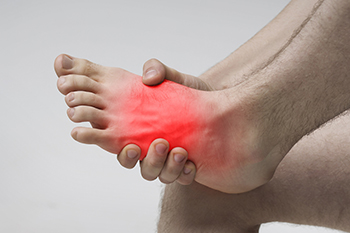Risk Factors for Foot Stress Fractures
Tuesday, 07 November 2023 00:00
Stress fractures, which are generally attributed to overuse, primarily affect weight-bearing bones and are often triggered by a sudden increase in physical activity. This serves as a significant risk factor for microscopic bone fractures in the feet. Embracing a new sport or intensifying exercise routines can elevate the likelihood of stress fractures. Biomechanical issues, such as abnormal gait patterns like flat feet or high arches and poor running form can also heighten the risk. Wearing inadequate footwear, including ill-fitting or worn-out shoes that offer insufficient support, places added stress on the foot bones. Nutritional deficiencies, particularly in calcium and vitamin D intake, weaken bones and make them more susceptible to such fractures. Hormonal changes, especially in women, like amenorrhea, can disrupt hormone balance and reduce bone density, which further increases the risk of stress fractures. Pain that starts during physical activity and worsens with continued exertion is a common symptom. Swelling in the affected area indicates inflammation, and tenderness of the bone to the slightest touch is another indicator. If these symptoms persist for about a week, it is suggested that you make an appointment with a podiatrist for a full exam, which may include imaging tests, as a foot stress fracture may not be visible on an X-ray.
Stress fractures occur when there is a tiny crack within a bone. To learn more, contact Dr. Mark Spier from Maryland. Our doctor can provide the care you need to keep you pain free and on your feet.
How Are They Caused?
Stress fractures are the result of repetitive force being placed on the bone. Since the lower leg and feet often carry most of the body’s weight, stress fractures are likely to occur in these areas. If you rush into a new exercise, you are more likely to develop a stress fracture since you are starting too much, too soon. Pain resulting from stress fractures may go unnoticed at first, however it may start to worsen over time.
Risk Factors
- Gender – They are more commonly found in women compared to men.
- Foot Problems – People with unusual arches in their feet are more likely to develop stress fractures.
- Certain Sports – Dancers, gymnasts, tennis players, runners, and basketball players are more likely to develop stress fractures.
- Lack of Nutrients – A lack of vitamin D and calcium may weaken the bones and make you more prone to stress fractures
- Weak Bones – Osteoporosis can weaken the bones therefore resulting in stress fractures
Stress fractures do not always heal properly, so it is important that you seek help from a podiatrist if you suspect you may have one. Ignoring your stress fracture may cause it to worsen, and you may develop chronic pain as well as additional fractures.
If you have any questions, please feel free to contact one of our offices located in Columbia and Reisterstown, MD . We offer the newest diagnostic and treatment technologies for all your foot care needs.









